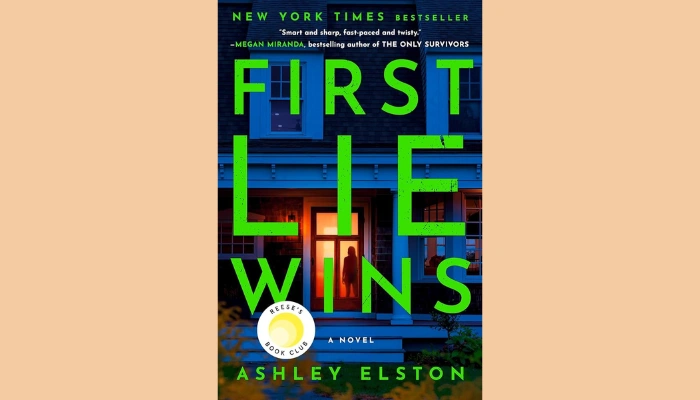Have you ever been in a conversation where the first person to bend the truth seems to control the entire exchange? This phenomenon isn’t just coincidence — it’s known as “First Lie Wins.” As a book lover and psychology enthusiast, I’ve often found myself analyzing characters in stories like Ashley Elston’s First Lie Wins, but it turns out, the concept is as relevant in real life as it is in fiction.
In this article, we’ll explore what “First Lie Wins” really means, the psychological reasons behind telling the first lie, and how it impacts relationships, decision-making, and everyday interactions. I’ll also share a real-life case study to make these ideas more tangible, along with practical insights to recognize and respond to this subtle form of social manipulation.

Content
What Does “First Lie Wins” Mean?
The phrase “First Lie Wins” refers to the idea that the first person to introduce a falsehood in a conversation often gains a temporary advantage. Essentially, by controlling the initial narrative, they can influence how others perceive the truth.
Think of it like a chess game: the player who moves first sets the tone for the board. Similarly, the first lie can shape perceptions, sway opinions, and create doubt before anyone else has a chance to counteract it.
In books, this concept is often dramatized. In First Lie Wins, the main character uses clever deception to stay ahead, creating a thrilling cat-and-mouse game. In real life, it manifests in subtler ways — someone exaggerating a story at work or downplaying a mistake before others notice.
Understanding this idea is crucial because it blends human behavior, social psychology, and deception, helping us decode everyday interactions.
The Psychology of Lying First
Why do people lie first? The psychology of lying shows that deception isn’t always malicious — sometimes it’s strategic or protective. Several factors motivate someone to tell the first lie:
- Self-Preservation: People often lie first to protect themselves from embarrassment, blame, or punishment. For instance, a team member might cover up a missed deadline by blaming external circumstances.
- Power Dynamics: Introducing a lie first can give someone subtle control over a conversation. This aligns with the principle of social dominance — the first lie can set the agenda.
- Manipulation and Influence: In some cases, individuals lie first to influence perception, nudge behavior, or test reactions. This is common in negotiations or social scenarios where outcomes matter.
- Cognitive Advantage: Once a lie is in place, the liar can guide others’ thinking, making it harder for the truth to emerge. Our brains often fill in gaps based on initial information, giving the first liar an edge.
This is where the concept of human behavior and deception comes into play. Recognizing these patterns helps you identify when someone is setting the narrative, giving you a chance to respond strategically.
Real-Life Case Study: The Workplace Scenario
To make this more concrete, let me share a real-life example from my experience in project management.
A colleague, Sarah, missed an important deadline. Before anyone noticed, she mentioned that the delay was due to a sudden client request — technically true, but she exaggerated the impact to cover her oversight. Because she lied first, the team initially believed her story, and the conversation framed her as a victim of circumstances rather than someone responsible for a delay.
Later, the truth came out, but by then, the first lie had already influenced perceptions. This is a classic example of how the first lie affects relationships and workplace dynamics. Recognizing such behavior is key to maintaining transparency and trust in any environment.
Also Read: Today Tonight Tomorrow
Examples of “First Lie Wins” in Everyday Life
The phenomenon isn’t limited to workplaces or books — it appears everywhere:
- Friendships: A friend may lie about why they canceled plans to avoid hurting feelings. Often, this initial lie shapes your perception and prevents confrontation.
- Romantic Relationships: Small, strategic lies (“I was busy tonight”) can create an advantage in controlling narrative or emotional responses.
- Family Interactions: Children sometimes lie first to avoid punishment, knowing that the initial story sets the frame for any follow-up questioning.
- Negotiations & Business: Salespeople or negotiators may present exaggerated benefits first, guiding the discussion before objections arise.
These examples show that first lie wins theory explained is not just literary; it’s embedded in everyday interactions and decisions.
Effects of Lying First in Relationships
The impact of lying first varies depending on context and intent:
- Short-Term Effects: The first liar gains immediate control over the narrative, avoiding confrontation or gaining advantage.
- Long-Term Effects: If discovered, trust can erode quickly. Repeated first lies can strain relationships, leading to skepticism and defensive behavior.
- Psychological Consequences: People who lie first may experience guilt, anxiety, or stress, while recipients of lies may feel confusion, betrayal, or resentment.
By understanding these patterns, we can better navigate lying in relationships and maintain healthier communication.
How to Detect When Someone is Lying First
Detecting the first lie requires careful observation and awareness of subtle cues:
- Inconsistencies: Pay attention to changes in their story over time.
- Over-Explanations: First liars often provide excessive detail to appear credible.
- Behavioral Cues: Nervousness, fidgeting, or unusual pauses can indicate deception.
- Timing of Information: Notice who introduces information first — early narratives may be strategic.
Using these strategies, you can identify when someone is attempting to control the narrative and respond thoughtfully.
Conclusion: Why Understanding “First Lie Wins” Matters
The concept of “First Lie Wins” goes beyond fiction. Whether in literature, workplace dynamics, or everyday interactions, recognizing the strategies behind first lies can give you an edge in communication, improve your judgment, and strengthen relationships.
By analyzing the psychological reasons behind telling the first lie, observing behavior, and learning from real-life scenarios, we gain insights into human nature and the subtle ways truth and deception interplay.
If you enjoyed exploring deception in First Lie Wins, check out our insights on Troubles In Paradise for more gripping twists and complex characters.
FAQs
What is the First Lie Wins book about?
A thrilling story of cons, deception, and twists centered on a clever protagonist staying ahead with lies.
Is First Lie Wins spicy?
The book focuses on suspense and clever cons, with light romance but no explicit content.
What is Colleen Hoover’s darkest book?
Hoover’s It Ends With Us is often considered her darkest emotionally intense novel.
Will First Lie Wins be a movie?
As of now, no official movie adaptation of First Lie Wins has been announced.

Meet Jessica, our bookworm extraordinaire! She’s an avid reader with a penchant for mysteries and a soft spot for fantasy worlds. Join her in exploring the pages of literary treasures.












